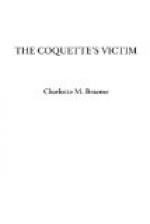“Did he say that—my Basil, Mr. Forster? If that be the case, rest assured—although I blush to say it—there is a woman in it. I can imagine Basil capable of suffering anything from a mistaken motive of chivalry. Do you know with whom Mr. Carruthers has chiefly associated since he has been in town?”
“I do not. I know that he has been in a very fast and fashionable set; he told me as much; also that he has spent a good deal of money. One check for three thousand pounds vanished in a day, and he gave no account of it.”
“Three thousand pounds!” cried Lady Carruthers; “yet he neither drank, betted nor gambled.”
“No,” said the lawyer; “Mr. Carruthers told me he had never touched a card and never would. I know he did not care for betting.”
The proud, anxious mother raised her eyes to the lawyer’s face. “How, then, do you think he has got through it?”
“I cannot tell. You must pardon me, my lady, if I remind you that although I am family solicitor, agent and manager of the property, I am not the guardian of your son.”
“I know,” she said, clasping her hands. “I little thought he would ever need a guardian; he seemed all that was honorable and upright. I cannot imagine what has changed him. I regret so bitterly that I let him go to London alone.”
“It is a terrible position,” said the lawyer; “the only thing is to clear him as much as we can. The moment I read this I wrote an answer and sent it to the ‘Times’ to the effect that Mr. Carruthers had gone abroad.”
A slight frown came over the delicate face.
“I implored Mr. Carruthers to write an indignant denial, and to let me go to Paris to post it, but he would not hear of such a thing; the very idea seemed offensive to him, I hope, Lady Carruthers, to induce you to write such a letter.”
“What kind of a letter?” she asked.
“One to the editor of the ‘Times’ denying the report, and saying that your son has gone abroad.”
“But that would be grossly untrue,” she said.
“Yes, yes! I know that, still if we can save him, we should.”
“I will try any honorable means you choose to suggest,” she replied; “but not even to save my son from death could I consent to write or publish a lie.”
“Of course you know best, Lady Carruthers,” said the lawyer, with a shrug of the shoulders. “Words are but words, and very few of them might have saved your son from public shame.”
“I have never yet believed in the success of a lie,” said her ladyship.
“Pardon me,” said Mr. Forster, grimly, “then you have forgotten the pages of history. I came down purposely to persuade your ladyship to do this. I am well aware that at first sight it seems contrary to all one’s notions of truth and honor, but there is so much at stake. My denial, couched in strong terms, will appear tomorrow. If it were succeeded by a letter from your ladyship, written in the same strain, people would laugh and believe that it was a great mistake. I had so many inquiries this morning before I left London, and I gave the same answer to all, that it was the sorry jest of an evil-disposed person. If your ladyship would but second my efforts, all would be well; we could get him through in safety.”




